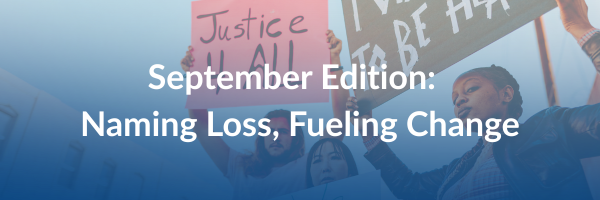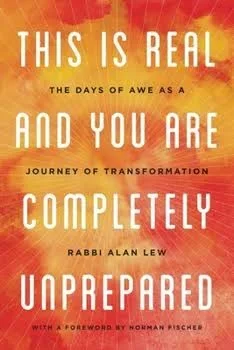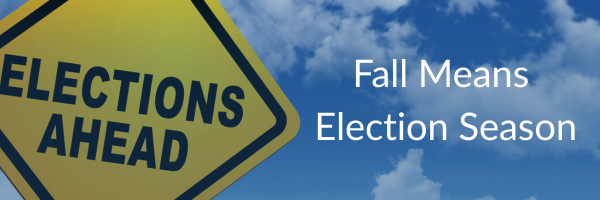September 2025 Edition: Naming Loss, Fueling Change
Symone Harmon from the Women’s Law Project Pittsburgh sharing with us how lawyers are needed to represent youth in the Judicial Bypass process.
Saludos, it is Angelique here!
This month’s Repairing Together newsletter lifts up our theme: Naming Loss, Fueling Change—honoring grief as a source of collective strength and action.
At our most recent Repairing Together (Tikkun Yachad) gathering, we came together to honor the grief and loss—personally and collectively—and to transform our grief into fuel for action. With wisdom and grounding we affirmed that acknowledging sorrow is not separate from justice work; it is the ground from which new pathways of care and change emerge. Symone of the Women’s Law Project shared with us about the Judicial Bypass process and the needs that show up inside of that work. Together, we listened, shared, and strengthened our resolve to build the world we long for—one rooted in truth, resilience, and collective power.
As the Jewish High Holy Days are coming up I invite you to make space for the grief showing up at what is being witnessed. That in the same measure of actions taken we create space for the processing grief. We don’t stay there we gently support each other in moving through toward action. Let it be fuel, in right timing. This edition’s care practice offers something of a way to feel and move through the grief we are witnessing.
The resource highlighted weaves our conversation of grief along with the days of Awe, Rabbi Alan Lew gifts us with a way to move through. As things continue to unfold may we find strength and support in each other. May your Rosh Hashanah and Yom Kippur bring you strength and nourishment.
Shanah Tovah U’Metukah (a good and sweet year)
& G’mar Tov! (a good completion)
With heart,
Angelique Rivera (She/Her)
Advocacy Manager &
NCJW Pittsburgh Team
-
This month’s practice invites us to honor what we carry, release what we can, and transform grief into fuel for change. You can try this on your own or with a group.
1. Naming the Loss
Write down a grief, loss, or rage you carry on a post-it note.
Place the note on a board or wall to make visible what is being held.
Pour a small amount of saltwater (representing tears) into a central bowl, creating a collective grief bowl.
2. Somatic Release
Shake out your arms, stomp your feet, or exhale with sound.
Let your body move in whatever way feels right to release the energy of grief.
Notice how your breath and body feel after letting go.
3. Fueling Change
On a new post-it note, write: What change is this grief fueling moving forward?
Place this note on a second board or space, symbolizing transformation from loss into action.
4. Somatic Receiving
Place your hands over your heart, then open your chest in a gentle stretch.
Take a collective inhale and exhale.
Stand tall, grounding in the strength of shared encouragement.
This practice reminds us that we don’t carry grief alone. Together, we can hold what hurts, release what weighs us down, and step into action with renewed strength.
Angelique Rivera
Advocacy Manager
Resource Highlight:
This Is Real and You Are Completely Unprepared: The Days of Awe as a Journey of Transformation By Rabbi Alan Lew
There are times in life when we are caught utterly unprepared: a death in the family, the end of a relationship, a health crisis. These are the times when the solid ground we thought we stood on disappears beneath our feet, leaving us reeling and heartbroken, as we stumble back to our faith.
Are you curious about what questions we share at the Repairing Together Event?
What is a loss you carry that shapes how you show up for justice?
How do you honor loss in your relationships and communities?
How can our grief become fuel for the changes we are fighting for together?
*Optional: We’d love to hear and share your responses in our newsletter anonymously or with attribution. This is how we fill each other’s hope cup! Send your answer to arivera@ncjwpgh.org
-
The transition from summer to fall means different things to different people—back to school, crisp weather and fall foliage, pumpkin spice everything. As a politics nerd, when the weather cools and the leaves start to change, it means one thing: election season.
The even-year elections, especially presidential years, get most of the attention—and they are very important. But when it comes to our day-to-day lives, the people we elect locally often have the greatest impact. County, city, and borough councils, school boards, and mayors all make decisions that shape how our schools, neighborhoods, and communities function.
And there is another big way that off-year elections touch our lives: judicial elections. This November, Pennsylvanians will vote for judges to the PA Supreme Court, PA Commonwealth Court, PA Superior Court, and local Courts of Common Pleas. We’ll also decide whether previously elected judges should retain their seats.
Here’s a quick overview:
PA Supreme Court: Interprets the state constitution, similar to the U.S. Supreme Court.
PA Superior Court: The main appellate court for criminal and civil cases.
PA Commonwealth Court: Handles cases involving state government and regulatory issues.
Court of Common Pleas: Decides a wide range of cases including felonies, family law, contracts, property disputes, guardianship, and estates.
Magisterial District Courts: Lower-level courts that manage traffic violations, bail, arrest warrants, small claims under $12,000, and Protection from Abuse orders.
Judicial races look a little different from other elections. Candidates can’t campaign on how they would rule on specific issues. Many at the Common Pleas and Magistrate levels also cross-file, meaning they appear on the ballot with more than one party affiliation. And aside from magisterial judges, all judges face retention votes every 10 years—a simple yes/no ballot on whether they should stay in office. This year, three PA Supreme Court justices are up for retention.
So how can voters make informed choices? Fortunately, there are many resources available. Bar Association ratings, candidate guides, and endorsements from issue-based organizations are helpful for learning about judicial experience and philosophy. For retention votes, it’s important to look at a judge’s record. Recent cases before the PA Supreme and Commonwealth Courts have included major decisions on redistricting, education funding, mail-in voting, free speech, and Medicaid funding for abortion care.
Want to learn more? Check out these nonpartisan resources:
Rachel Martin Golman
Sr Director of Social Impact
-
When I turned 18, I did two things: bought a pack of cigarettes (even though I didn’t smoke) and registered to vote. The cigarettes were just because I could—but the registration, and later casting my first ballot, filled me with real excitement.
That was 30 years ago. In many ways, things have changed; in others, they haven’t. Over the last year and a half, working with the Allegheny Youth Vote Coalition, I’ve witnessed that same excitement in so many of our local teens. They care deeply about the issues that affect them and their communities. They’re eager to connect those issues to elections at every level, to meet candidates, and—when supported—to register and to vote.
This fall, we’re working alongside coalition partners, teachers, administrators, and most importantly, student leaders, to organize our third Allegheny Youth Vote Huddle on October 1 at the Heinz History Center.
At the Huddle, teens from across the county will:
Share the issues that matter most to them.
Learn how to understand elections, research candidates, and recognize mis- and disinformation.
Develop concrete plans for hosting voter registration drives at their schools.
Sessions will be facilitated by teen leaders, and participants will also have the chance to engage directly with former and sitting judges—while being in community with their peers.
How You Can Support
Invite a teen. If you know a young person, encourage them to attend the Huddle. More information and registration can be found here.
Volunteer. Voter registration drives are held during the school day, and PA clearances are required. If you’re interested, reach out to Rachel at rmartingolman@ncjwpgh.org.
Donate. Your contribution ensures we can keep supporting local teens on their civic engagement journeys.
Together, we can nurture the next generation of voters, leaders, and change-makers—thirty years from now, they’ll have stories of their own first ballots to tell.
Rachel Martin Golman
Sr Director of Social Impact
-
Children's clothing and accessories sizes 0 months - 14 years are free every day Thriftique is open. Simply choose the items that you can use, and take them to the register to be counted. This program is completely free and open to everyone. Please help us get the word out about Free Kids Clothing!
If you have children's items in good condition to donate, we would love to take them off your hands! We are also always looking for folks to volunteer a few hours of their time to process donations, sort, and hang them. The more help we have, the more families we can serve. If you are interested in volunteering with the Free Kids Clothing program at Thriftique, email Heather at hvisnesky@ncjwpgh.org.
Thriftique Essentials Voucher Program
For over a decade, NCJW Pittsburgh has offered direct support to the community through our clothing voucher program, originally intended to help women who were in financial transition and entering or re-entering the workforce in need of business attire.
The current iteration of the program is called Thriftique Essentials and has expanded to provide clothing, shoes and accessories, furniture, linens, small appliances, and housewares to recipients. The program operates in partnership with area organizations and agencies providing direct services to our Pittsburgh neighbors. This year, we have partnered with 18 area non-profits to distribute the vouchers.
This month, we are highlighting our partnership with Dress for Success Pittsburgh! Dress for Success Pittsburgh signed on as a Thriftique Essentials partner this year. Their mission is to empower women and nonbinary people across the region to enter or re-enter the workforce with confidence. They provide professional attire, career development, and a supportive community to help women thrive in their careers.
Dress for Success Pittsburgh envisions a world where women live free from poverty, are treated with dignity and respect, and contribute to the growth of their families and communities. Their impact extends across Southwestern Pennsylvania, including Allegheny, Butler, Fayette, Greene, and Washington Counties.
Dress for Success Pittsburgh’s mission is in perfect alignment with the spirit of Thriftique Essentials, and we are so grateful to count them among our wonderful partner organizations!
Fall Means Election Season
Check out these nonpartisan resources:
Youth Vote Huddle
How You Can Support
Invite a teen. If you know a young person, encourage them to attend the Huddle. More information and registration can be found here.
Volunteer. Voter registration drives are held during the school day, and PA clearances are required. If you’re interested, reach out to Rachel at rmartingolman@ncjwpgh.org.
Donate. Your contribution ensures we can keep supporting local teens on their civic engagement journeys.
Until Next Month!
Repairing Together Advocacy Newsletter
Building Collective Care, Collective Power, and Collective Action









